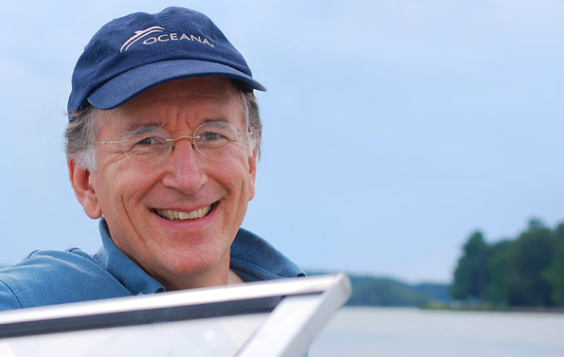
Andy has led Oceana since 2003, and since that time it has grown to be the largest international conservation organization fully dedicated to protecting the oceans.
ODP: Nearly one billion people around the world woke up hungry today. And the number of people on the planet keeps growing. You believe that the ocean can play a bigger role in feeding the world. How so?
AS: Millions of people around the world already rely on the oceans for sustenance. If properly tended and cared for, oceans could provide a nutritious meal for a billion people, every day. But right now, we are headed for about half that by 2050. If we implement proven management measures, we can increase the global fish catch which results in more healthy seafood meals available every day. And not only is wild-caught fish an accessible protein to millions of people, but it is also healthy! Studies have found that switching from red meat to seafood reduces the risk of heart disease, cancer, and diabetes, and provides numerous other nutritional benefits. At Oceana, we like to call fish the “perfect protein,’ which is also the title of my book.
ODP: What are the keys to restoring wild fisheries?
AS: The oceans are vast and figuring out where to start can be tricky. But fortunately, just 29 countries and the EU control over 90 percent of the world’s fish catch. We work on policy changes in these key countries to maximize our global impact. Every coastal country has exclusive control of the water 200 nautical miles off its coast, so it is in the country’s self-interest to set rules and laws to increase the amount of fish they can eat and sell. The first step to rebuilding is to stop overfishing. Oceana does this by campaigning to get governments to set and enforce scientific quotas, reduce harmful subsidies, and stop illegal, unreported, and unregulated fishing. Stopping overfishing combined with reducing bycatch, protecting habitat, curbing pollution and promoting transparency will lead to more abundant oceans. One example of this strategy working is an amendment to the Magnuson-Stevens Act in 2006 that strengthened science-based catch limits. In 2000, U.S. stocks were overfished at rates of nearly 38 percent. In 2015, after the amendment was put in place, only 16 percent were still being overfished. The science is clear: when regulations are put in place and followed, the fish come back.
ODP: When it comes to climate change, why are fish a better choice than meat?
AS: Worldwide, livestock accounts for over 15 percent of all human-induced greenhouse gas emissions. Methane is a substantial contributor to these emissions and you know who produces methane? Cows and other livestock. Do you know who doesn’t? Fish. Every time somebody chooses a seafood meal in the future, they are not choosing a hamburger. Rebuilding ocean abundance, therefore, helps stop climate change.
ODP: So if we as a planet invest in ending overfishing, what is the upside potential?
AS: In addition to the positive impacts it has on hunger, climate and health, restoring fish populations also helps to address biodiversity loss on land and in the water. Agriculture is a big driver of biodiversity loss in the land. Why? Because we cut down forests to plant corn and soybean fields. That means an abundant ocean helps protect biodiversity on the land. Wild fish is also one of the most cost-effective forms of protein and requires the least amount of fresh water for production, ranking even below legumes. Sometimes people say to me “this doesn’t make sense, you’re trying to save the fish, so we can eat them?” But in the ocean, there is no war between the goal of feeding people and rebuilding nature. When we rebuild fisheries, we restore healthy oceans and create more food. It’s good for those who live in the sea and those who live on the land.
ODP: Throughout your career, you have always aimed high and Oceana has consistently “punched above its weight” in terms of impact. What is the secret to this success?
AS: Every action Oceana takes is connected to a strategic, directed campaign that has the goal of protecting the oceans. Oceana uses a country-by-country approach to run campaigns that lead to national policy outcomes within a 3 to 5-year timeframe. We resist the common urge to spread ourselves thin across too many objectives, and we stay accountable for our goals. This strategy is designed to lead us to real ocean victories and it has done exactly that. We have secured over 200 victories since our founding in 2001.
Thanks so much, Andy, for helping us kick off our special Earth Week content with a deep dive into seafood, fish and ocean conservation. Andy’s book on this topic is indeed called The Perfect Protein, and we hope our readers will check it out, and don’t miss the recipes at the end!


